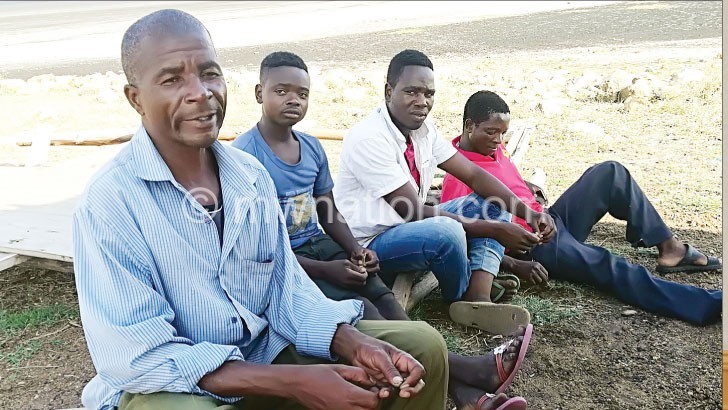Lake Chilwa dries up with people’s hopes
Along the marshy Lake Chilwa wetlands in Zomba, Phalombe and Machinga districts, people’s hopes continue to fade by the day.
All eyes are up in the air—gazing on a developing thin cloud—hoping for drops of rainwater to fill Lake Chilwa, whose existence has utterly disappeared into thick dry clay soils.
For the third time, the lake—which is the only main source of livelihoods for majority of the population in the three districts and beyond—has reached its worst drying point.

The pain has spared no one. A sight of young men seated on scattered stones, which forms the lake-bed at Kachulu Fishing Point, tells you how the drying up of the lake has reduced the breadwinners to nothing.
They are fishers and for a year now, they have been watching their boats and canoes gathering moss at the docking point. The idleness also means high costs for repairs.
“I had a boat, but I broke it into firewood because the costs that I would incur to repair it when the water levels improve is closer to a new one,” says James Nkate, one of the fishers.
Lake Chilwa for livelihood
For over 20 years now, one fisher Anderson Thembwa has lived on income generated from the lake. He says he did not go far with education because he was exposed to easy money. He did not even blink on his decision to marry while young.
On a good day, Thembwa says he would make about K5 000 from fish sales. But these are stories of the past. For the previous year, life without the lake has taught him a lesson. He now survives on piecework in farms.
During The Nation’s visit to Kachulu, we found business at a standstill. The shops and restaurant were empty and locked. So was the main fish market.
Margret Kuthabe, 32, has been running a groceries shop at the main fishing market and describes life without the lake as devastating.
“When business is thriving, I make K15 000 in a day,” she explains. “There is no business now. When morning comes, it is time to look for piecework in farms, but they are now scarce due to demand.”
Fisheries Department says 9 000 fishers and over one million people have been affected by the drying up of Lake Chilwa and close to 30 000 people who live on buying and drying fish for sale are affected. The economy is not spared. Malawi is currently losing $21 million (about K15 billion) generated from the lake annually.
Rice farming without Lake Chilwa
For some who foresaw this tragedy, they were quick to adopt coping measures such as rice farming. For instance, Thembwa, who now chairs a committee on preserving Lake Chilwa ecosystem, quit fishing for rice farming.
“We were warned in time and I took heed of the alerts to try other sources of income for livelihood. Rice is the only crop that responds well here,” he says.
But that was not enough to detach his family from reliance on the lake. Like many other farmers, Thembwa works with schemes which rely on water from the lake to flood their gardens and the drying up of the lake means horror. The story is shared across all irrigation schemes along the lake.
Access to education compromised
Life without rice farming and fishing has reduced almost everyone to piecework. Those in entrepreneurship are busy cutting down last standing trees for charcoal. Every labour force in the household, including children is being put to full use.
Patson Kadaya, 18, says he was introduced to fishing at the age of nine. He is the only boy in the family and her divorced mother relies on him for everything.
“At first, I was able to balance fishing and schooling, but it was not sustainable such that I dropped out while in Standard Five for fishing to keep my siblings in school, but it’s hard now,” he explains.
Any way out?
In vox pop interviews with communities around Kachulu, we noted that the villagers are not ready for alternatives. Their hopes are on the sky to give them abundant rains to fill the lake again.
However, Leadership for Environment and Development in South and East Africa (Lead-Sea) which is engaging chiefs from Phalombe, Zomba and Machinga districts, gives hope to the community.
There is consensus that the lake is a victim of poor farming activities such as cultivation along the river banks and deforestation. The initiative by Lead-Sea is tasking the chiefs to think and talk about solutions.
At a recent stakeholders meeting in Zomba, the chiefs spelt out solutions tied to conserving the environment and rivers that feed into the lake. The chiefs challenged themselves to be custodians of their environment and promote tree planting, especially fruit trees.
“We wanted the stakeholders to come up with strategies for managing the immediate drying up of the lake, but also what should be done in the long run,” explains Lead-Sea director Sosten Chiotha.
Director of forestry Clement Chilima says government’s priority is to restore damaged forests and preserve the resources through security provided by full time forest guards. This, he says will help to preserve water and bring in more rains.





